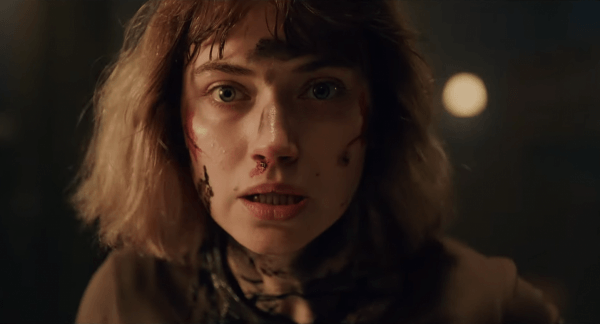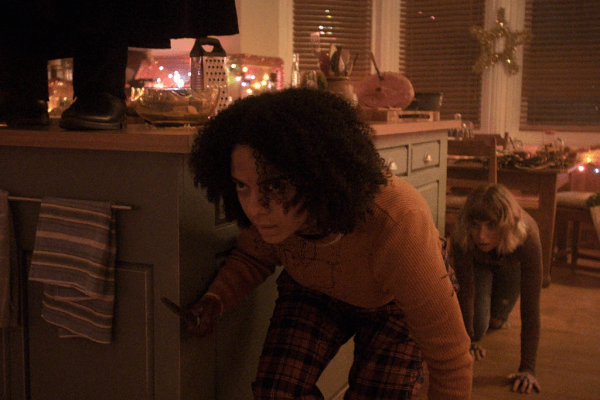Black Christmas, 2019.
Directed by Sophia Takal.
Starring Imogen Poots, Aleyse Shannon, Lily Donoghue, Brittany O’Grady, Caleb Eberhardt, and Cary Elwes.

SYNOPSIS:
A group of female students are stalked by a stranger during their Christmas break. That is until the young sorority pledges discover that the killer is part of an underground college conspiracy.

Nobody was asking for a second remake of Bob Clark’s delightfully macabre 1974 holiday slasher Black Christmas – previously remade to disastrous results in 2006 – but it’s at least easy to appreciate how a canny filmmaker with a real voice and vision could’ve spun a creative contemporary riff on the 45-year-old cult classic.
Sadly writer-director Sophia Takal (Always Shine) clearly wasn’t the right fit, because though she evidently has much to say about toxic masculinity and rape culture, this wince-inducingly heavy-handed movie collapses under her own unfortunate shortcomings as both storyteller and filmmaker.
The setup is devilishly simple, at least; Hawthorne College is getting quiet for the impending holidays, and a group of sorority girls sticking around for Christmas find themselves stalked by a masked, robed murderer, seemingly intent on wiping them out.
With plenty of her own prior trauma still being dealt with, student Riley Stone (Imogen Poots) will need to band together with her sisters and fight back against an aggressor keen to keep women “in their place.”
And with that, you probably get the gist of what angle this remake is coming from, and it’s at least a timely and somewhat imaginative one to tack onto a project which might otherwise seem entirely listless and cynical.

But within mere minutes of the new Black Christmas starting, it’s evident that we’re in for a bumpy ride. A mostly bloodless opening death scene confirms the film’s baffling PG-13 rating, and in the following scene, Takal and co-writer April Wolfe make it clear they’re going to spend the next 80-something minutes bashing the viewer over the head with their message.
While there was absolutely room for this movie to be both a creepy horror flick and a potent treatise on prevailing sexism, Takal is more interested in using her characters – especially the forthright Kris (Aleyse Shannon) – as trite mouthpieces for her social commentary, in the most absurdly on-the-nose, embarrassingly hamfisted way possible.
At times this feels less like a movie and more like an essay, as it grinds to a halt to spit talking points about the patriarchy rather than weaving them into the plot in a compelling way. Later on, a doofus male character launches into a “Not all men” spiel which is handled with neither the necessary nuance nor satirical nous.
And while I come at this movie from the undeniably privileged perspective of a white male, I suspect the pic may not play as well in more embattled circles as the filmmakers are expecting. This is because the film, at least from my POV, feels less like a genuine exploration of its themes and more a pandering, failed attempt to cash-in on what Hollywood most likely deems a “trend.”
But the film’s indelicate attempts to be current aren’t nearly as frustrating as the fact that Black Christmas simply isn’t effective as a horror film. While the 1974 movie had its anonymous killer making intensely disturbing phone calls to the sorority girls, this is switched out for the more contemporary DMs (direct messages), which is exactly as non-suspenseful and uncinematic as it sounds.

Ultimately, Black Christmas isn’t so much a remake as it is an appropriation of the original film’s branding, leaping off to tell a rather different “reimagining” of its most basic concept. The full extent of this only becomes clear in the film’s third act, with a barmy reveal so head-scratchingly ridiculous it almost allows the pic to cross the rubicon into entertaining camp – almost.
For the most part, though, the film is distressingly bland, with played-out “suspenseful” sequences we’ve all seen hundreds of times before, and jump scares you could set to a metronome. Even when our beleaguered femmes end up attacked, the action is handled so poorly – cut to shreds by some of the worst editing I’ve ever seen in a horror film – that there’s virtually nothing left to enjoy.
What scarcely keeps this film from earning a full one-star write-up is the quality of the performances, making this quite probably the best-acted terrible movie you’re likely to see this year. Imogen Poots is a terrific actress and does her level-best to lend the material some sympathetic solemnity, especially as it pertains to her character’s traumatic past, even if she’s ultimately limited by the dopey material. The entire ensemble cast does solid work, honestly – including an amusingly OTT Cary Elwes as a sexist university professor – with a believable chemistry among the focal group of ladies despite being largely for nought.
Black Christmas is a lazy movie yet not in the way you might think; it’s not just a thoughtless rehash of the ’74 film, but a bone idle attempt to cash-in on present social concerns without the tact or creativity to actually do justice to those most impacted by it.
As social commentary it’s shallow and patronising, and as a horror film it’s hampered by atrocious editing, lame jump scares, and a patent lack of atmosphere. One of the 2019’s worst.
Flickering Myth Rating – Film: ★ / Movie: ★ ★
Shaun Munro – Follow me on Twitter for more film rambling.











